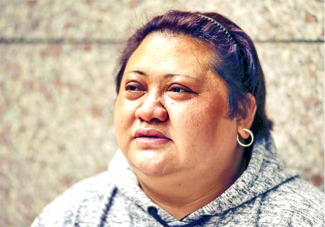SHAM VICTORY
Millionaires dodge paying homeless care-giver $28,000 settlement

Maria Tajan, cheated out of $28,000
WINNING HAS MEANT NOTHING to Maria Tajan. She’s still homeless, jobless and penniless 18 months after the Ontario Ministry of Labour ruled a former employer owes her $28,000. Worse still, she will likely never get a penny of it.
Maria is a single mother. She came to Canada about a decade ago through the live-in caregiver program. In 2017, Harvey and Sylvia Gefen hired her to be a live-in caregiver four days a week for their adult non-verbal son in mansion in a high end neighbourhood in Toronto. On the other days Maria lived in homeless shelters.
The Gefens fired Maria after six months, without giving her any notice or cause.
“I started to cry,” Maria recalls. “I (didn’t) know where to go.”
She called the police, who escorted her to a shelter.
Maria eventually found her way to Parkdale Community Legal Services who worked with her to file a complaint with the Ontario Labour Relations Board (OLRB). The Gefens fought her all the way.
Long, full work days
Maria told the board she regularly woke up as early as 6 a.m. to prepare breakfast for the Gefen’s son, who required constant care.
While their son attended a daily schooling program, Maria completed chores that included doing laundry, polishing silver, vacuuming stairways, cleaning a stove, dusting furniture, and scrubbing a shower floor and bathtub.
In the evenings, she supervised the Gefen’s son, before putting him to bed.
Harvey Gefen disputed all of Maria’s testimony. He denied owing Maria money and said she signed off on her bi-weekly pay stubs with no complaint while in his employ.
“We have many, many factories,” he said. “In my whole life, I might have had a couple of complaints with labourers.” He said he has employed “20 to 30 Filipino workers” over the years with few complaints.
Damning ‘duplicity’
The Gefens produced a copy of a termination notice they said they gave Maria.
The letter said Maria had been “warned repeatedly again and again” of “irresponsible behaviour”. In its ruling, the board found the letter was a “fabrication”.
They pointed out Maria was not even working on the day the Gefens allegedly gave her the termination notice. The board called the letter a “damning exposition of the Gefens’ duplicity.”
The OLRB ruling also describes Harvey and Sylvia Gefens’ evidence as “unreliable” and at times “fabricated.”
In the end the board rejected the Gefens’ evidence. Combined with her daytime chores, the board found Maria was working up to 85 hours a weeks, despite her 35-hour-a-week contract.
In total, the board found the Gefens owed Maria almost $28,000 in unpaid wages, overtime, public holiday, vacation, and termination pay. The Gefens were given 30 days to transfer the funds.
Maria is still waiting
That was in 2017. Maria has yet to receive a penny from the millionaire property developer Genfens.
The Ontario finance ministry took over the case in December 2019, sending the Gefens a letter demanding payment. By late February, the ministry had issued demands to several Toronto banks to garnish funds from the couple; in April, a lien was placed on the Gefens’ property. The Gefen family assets are listed in court records as being worth millions.
The Ministry of Labour could launch a serious prosecution against Gefen for failing to pay missing wages, says Mary Gellatly of Parkdale Community Legal Services’ workers’ rights division.
“The Ministry of Labour has a long history of being really bad at enforcing orders to pay when employers don’t want to pay,” said Gellatly. “The situation has become even worse under the current government.”
Effectively uncollectable
John No, a lawyer with Parkdale Community Legal Services says the truth is Maria is not likely to ever get any of what is owed her. He says a finance ministry official told him in a phone call last December that Maria’s wages were uncollectable.
It’s more evidence of a “systemic issue”, he says, that allows employers to regularly “act with impunity” and deny workers the justice they are entitled to.
“That’s not good enough,” says Gellatly.
Research conducted for the provincial government has found a “disturbingly low success rate” in recovering funds sent to collections. Of these cases, the study found only “20 per cent were subsequently satisfied fully.”
‘Workers should not suffer like this’
Maria is still living in a shelter. She’s tried her best to keep her spirits up — busying herself volunteering and upgrading her skills. Despite the anxiety caused by her own situation, she says she still feels “lucky” compared to many of those around her in shelters.
She’s now looking for new jobs and has obtained her permanent residency status.
One day, she says she hopes to reunite with her 13-year-old daughter currently in the Philippines. In the meantime, she is still fighting her case, calling the Ministry of Finance for updates and hoping for action.
While she’s gratified the board validated her experiences, she is frustrated with victory’s hollow ring — in her own case and others like it.
“Workers should not suffer like this.
- 30 -













Add new comment